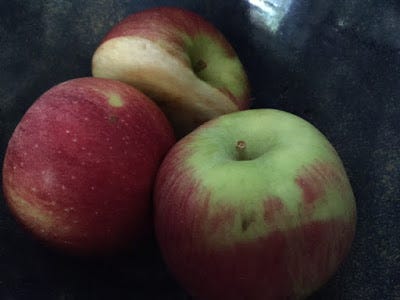A New Year: The Path of Paradox

Paradox is the beating heart of spirit. There is a tension between accepting what is and yearning for a better world. Contemplative practices bring us back to the moment, to the startling awareness that, really, this is the only moment that we have. The now carries a gratitude-centered spirituality. In Judaism, we say a prayer, Shehecheyanu, to mark beginnings, the first apple of the season, the first snowfall, the new year. The prayer gives thanks for the gift of being alive in the precious, unrepeatable moment of newness. At the same time, prophetic consciousness whispers in our ear, calling us to lean into the future. It resonates with the suffering of this moment and dreams of deliverance from poverty, racism, environmental degradation, and war. It is animated by an aching desire for change, for a better life for all the world's people. Gratitude and yearning are the figure and ground, the yin yang of awareness. We wake up every morning in the light of this paradox. We eat it for breakfast.
This year at Rosh Hashanah, I am thinking about paradox and about a blue farmhouse with a wrap-around porch that I lived in for twenty years. The house was opposite an enormous barn. The woman next door owned the barn and all the land except the six acres around our place. She rented her acreage to a farmer who raised beef cattle. The air was pungent with manure and the airwaves carried the deep, comforting lowing of the cows. They made the best neighbors, never playing their music too loud with open windows in summer, never operating machinery early in the morning. They just mooed and chewed. They just stared at our strangeness, like the cows in a Far Side cartoon strip.
Every year in September, the farmer would come over to ask if he could bring 'em over to our side of the road for fresh grass. He and his farmhands would put in temporary fencing with a gate along Division Street creating a large pasture on my side. When the fencing was complete, a date for the cattle herding would be set. The gates on the farmer's side and our side would be unlatched and the herd would cross the road like a group of very large, spotted kindergarten children on a field trip.
Often the arrival of the cattle would coincide with Rosh Hashanah. One year, my teenage son and I came home from services, changed out of our synagogue clothes and made ourselves tuna sandwiches on challah. We took our plates out to the back of the property and sat on the strip of grass just on the near side of the fencing. Several large cows came over to watch us eat. They shooed the flies with their tails and stared at us with loving incomprehension. After a while, there was a minyan and we felt deeply prayerful. We received the new year with gratitude and expectation.
There is value in remembering that the whole idea of a calendar with an annual cycle that begins at Rosh Hashanah is an artifact of the exodus, of liberation. As long as the Israelites were enslaved, every day was just like every other day. There was laboring and there was trying to stay alive in the midst of hunger and violence. The grammar of the calendar is grounded in choice, in an orientation towards the future. Today, I will feast. Tomorrow, I will plant my garden. Today, I will shop for a new coat. Tomorrow, I will visit a sick friend. But, elsewhere in the world, not very far from the biblical backdrop, life has been reduced to its most primitive. It has come down to surviving another day, without the luxury of imagining a future.
Here in New England, where neither Bashar al-Assad nor Vladimir Putin is trying to kill me, where the American air force doesn't rain bombs down on me either intentionally or by accident, I drink green tea and read a novel entitled Sons and Daughters of Ease and Plenty. I live my day as if everything were alright and then I watch Syria on TV. There are what the BBC calls disturbing images, followed in the next segment by Brad and Angelina in happier times. Carrying the disconnect between the goodness of life and the blood on the streets of Aleppo, not to mention Charlotte, is my greatest challenge as a conscious person. Giving the moment its due, lingering in the memory of bovine communion here, cannot crowd out my witness to the daily struggle there. Understanding that my comfort is an accident of history reminds me that I am here, but I might just as well be there among the hungry, the hunted. Every day offers me another opportunity to acknowledge the miracle of being alive and to hope for an end to injustice, the repair of the broken world.
On Rosh Hashanah in particular, the present is pregnant with the future like a mother and her baby. The gratitude for the present and the hope for the future are entwined in a rapturous caress that embraces the paradox of what it means to be alive.
Glitches in the transmission of my last post, Less Time, More Space have been fixed. Please give it another look.
Please share seventysomething with other interested parties. I welcome your comments on email, facebook or on this blog. If you do not have a gmail account, comment as Anonymous, but please tell me who you are in the body of the remarks.



